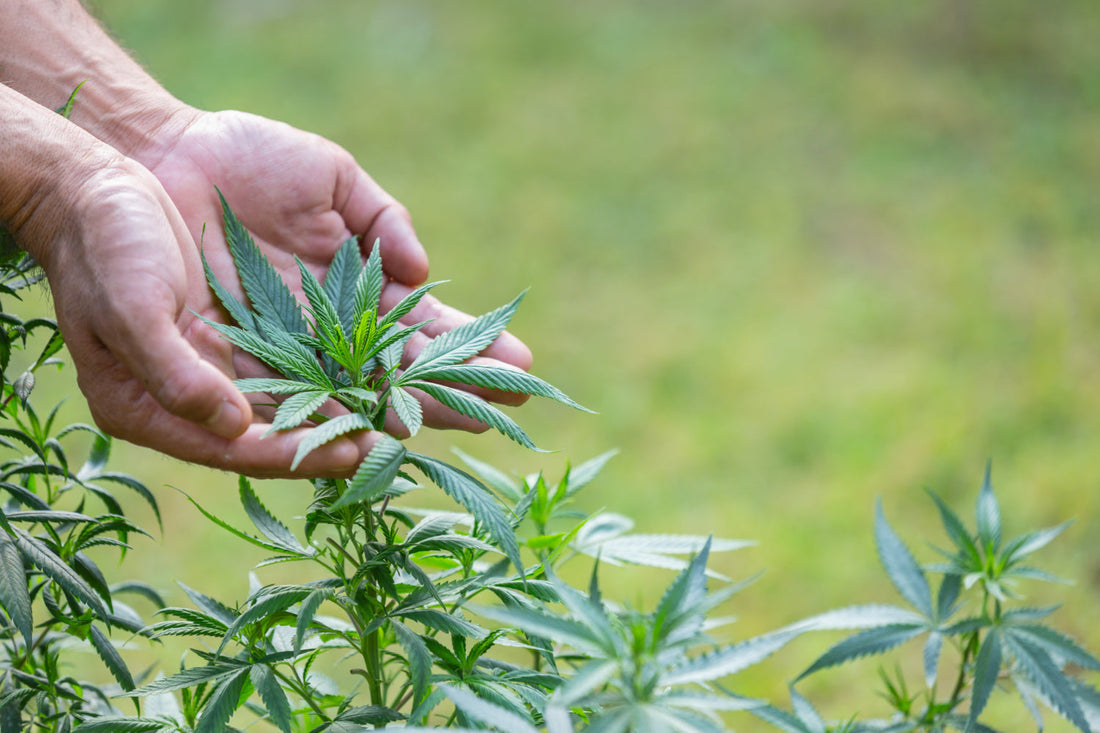Hey there, eco-warriors and wellness enthusiasts! Imagine this: You're sipping on a soothing cup of herbal tea, feeling the tension melt away from your joints after a long hike in the stunning landscapes of Casper, Wyoming. But wait—what if that relief came from a bottle of CBD oil that's not just good for you, but also kind to the planet? In today's world, where climate change headlines compete with our daily grind, the CBD industry is stepping up its game to go green. At Soothe Organic, we're all about that harmonious blend of nature's bounty and sustainable living, especially right here in the heart of Wyoming, where vast open spaces inspire us to protect what we love.
The CBD boom has exploded faster than a Wyoming thunderstorm, with products like CBD tinctures, oils, and softgels flying off shelves for everything from stress busting to pain relief. But as consumers like you demand more transparency, companies are pivoting toward eco-friendly practices that don't just talk the talk but walk the (sustainable) walk. In this fun, deep-dive blog, we'll explore how the CBD world is embracing sustainability—from hemp fields in Casper to your medicine cabinet. We'll sprinkle in some science, a dash of humor (because who says going green can't be groovy?), and insights into hot topics like CBD tincture vs oil, CBD for pain relief, CBD oil softgels, and CBD for joint and muscle pain. Buckle up; this is going to be an enlightening ride!
Key Takeaways: Greening the CBD Scene
Before we dive deeper, let's hit the highlights like a quick yoga session for your brain:
- Hemp Heroes: More CBD companies are ditching resource-hogging methods for sustainable hemp cultivation, turning this versatile plant into a superstar for eco-production.
- Pain Relief with a Planet Twist: CBD for pain relief, especially for joint and muscle pain, is gaining traction through studies showing potential benefits, all while companies ensure their sourcing is earth-friendly.
- Product Perks: From CBD oil softgels for easy dosing to tinctures vs. oils debates, sustainable practices are making these wellness staples even better.
- Wyoming's Wild Side: Local initiatives in Casper and beyond are leading the charge with regenerative farming that's as rugged and resilient as the Cowboy State itself.
- Challenges Ahead: Regulatory hurdles and waste woes are real, but innovative solutions like biodegradable packaging are turning obstacles into opportunities.
- Renewable Revolution: Hemp's low-water needs and renewable energy integrations are slashing carbon footprints faster than you can say "solar-powered extraction."
- Waste Not, Want Not: Repurposing by-products into biofuels or textiles is like giving hemp a second life—talk about reincarnation!
- Packaging Power: Eco-warriors are swapping plastic for compostable goodies, reducing landfill nightmares one refillable jar at a time.
These takeaways aren't just fluff; they're backed by real-world shifts that could make the CBD industry a model for sustainability. Now, let's unpack why this matters, especially for folks in Casper, Wyoming, where CBD oil is as local as bison burgers.

The Importance of Sustainability in the CBD Industry: Why Go Green When You Can Go Hemp?
Picture this: Hemp plants swaying in the Wyoming wind, absorbing CO2 like nature's vacuum cleaners, all while providing the raw material for your favorite CBD for pain relief products. Sustainability isn't a buzzword—it's the backbone of a thriving industry that's projected to hit billions by 2025. At Soothe Organic, we believe that eco-friendly practices aren't optional; they're essential for delivering high-quality CBD oil in Casper, Wyoming, without costing the earth (literally!).
From cultivation to consumption, sustainability touches every step. Hemp, the hero crop, requires far less water than cotton or corn, making it a sustainable champ in arid spots like Wyoming. Organic farming boosts biodiversity, keeps soils healthy, and ditches harmful chemicals that could leach into our pristine rivers. Plus, it translates to purer products—think CBD oil softgels that pack a punch for joint and muscle pain without synthetic residues.
But here's the fun part: Going green boosts the bottom line! Companies adopting these practices see cost savings from efficient energy use and a loyal customer base. A Nielsen study shows 73% of consumers are willing to switch habits for the environment, so sustainable CBD isn't just ethical—it's smart business. In Casper, local growers are pioneering regenerative techniques, enriching soil for future generations while producing top-tier CBD for pain relief.
Regulatory bodies are catching on too, pushing for stricter environmental standards. By prioritizing sustainability, CBD brands like ours set the bar high, appealing to eco-conscious folks seeking CBD tincture vs oil options that align with their values.
Challenges Faced by CBD Companies: The Thorny Path to Green Glory
Alright, let's get real—no journey to sustainability is a walk in the park (unless it's a hemp field, of course). CBD companies, including those in Wyoming, face a gauntlet of hurdles that could make even the toughest cowboy sweat.
First up: Regulatory Rodeo. CBD's legal status is as varied as Wyoming's weather—federal okay, but state tweaks abound. In Casper, recent bans on certain hemp-derived products highlight the need for compliant, sustainable alternatives. Balancing eco-practices with regs can feel like herding cats.
Then there's Cultivation Conundrums. Hemp loves water and nutrients, but shifting to organic or permaculture? That's a hefty investment. Yet, studies show it's worth it for reduced environmental impact.
Energy Eats: Indoor grows guzzle electricity—up to 1% of U.S. usage! But renewables like solar are game-changers, especially in sunny Wyoming.
Waste Woes: Extraction creates tons of biomass waste, and packaging? A Canadian study pegged millions of kilos in landfills, with U.S. numbers even scarier. Plastic from CBD oil bottles is a villain, but we're fighting back.
Supply Chain Shenanigans: From farm to shelf, ensuring fair labor and low-emission transport is tough, but transparent chains build trust.
Education Edge: Many don't know CBD's eco-footprint, so brands must teach while being open.
Cost Crunch: Upfront expenses sting, but long-term savings and premium pricing (hello, willing consumers!) make it viable.
R&D Race: The industry's young, so ongoing research into green methods is key.
Despite these, companies in Casper are innovating, like using local hemp for CBD for joint and muscle pain products that are as sustainable as they are effective.

Renewable Resources: Hemp's Superpower and Beyond
Hemp isn't just a plant; it's a sustainability superhero! Growing in 90 days with minimal inputs, it's perfect for Wyoming's climate. Organic hemp sequesters carbon, improves soil, and needs less water—ideal for drought-prone areas.
At Soothe Organic, we source from Casper farms using these methods, ensuring our CBD oil for pain relief is pure and planet-friendly. Studies back hemp's eco-credentials, showing it absorbs heavy metals and boosts biodiversity.
Energy-wise, ditching fossil fuels for solar or wind cuts emissions. In the U.S., cannabis production's energy bill is huge, but renewables slash it. Fun fact: One Wyoming farm powers its extraction with wind—talk about breezy business!
Tying into products: When debating CBD tincture vs oil, know that tinctures (alcohol-based) often use sustainable ethanol from renewables, while oils (carrier-based) benefit from eco-extraction like CO2 methods. Both can aid CBD for pain relief, with research showing reductions in chronic pain by up to 66%.
Waste Reduction Strategies: Turning Trash into Treasure
Waste? Not on our watch! In the CBD world, minimizing it is like alchemy—turning leftovers into gold.
By-Product Recycling: Spent hemp becomes animal feed or biofuel, creating revenue while cutting waste.
Fiber Fun: Hemp fibers make textiles or paper, reducing deforestation. Imagine your CBD oil softgel packaging from recycled hemp—meta!
Closed-Loop Magic: Reuse waste for energy or nutrients, embodying circular economy vibes.
Team Training: Educate staff for a culture of green—because sustainability starts with people.
Metrics Matter: Track waste to improve, like Casper farms monitoring for zero-waste goals.
For CBD for joint and muscle pain, sustainable waste practices ensure potent, clean products without environmental guilt.
Packaging Solutions: Wrapping Up Sustainability with Style
Packaging is where CBD can shine or stink environmentally. Ditch single-use plastics for biodegradable hemp-plastics that vanish like magic.
Recyclable glass or metal? Infinite loops! Reduced designs cut material use, while refillables save cash and trash.
Compostable options turn waste into soil food, and educational labels guide proper disposal. Life-cycle assessments help brands like ours in Casper refine for max eco-impact.
Our CBD oil softgels come in eco-packs, perfect for on-the-go pain relief without planetary harm.
.

In Conclusion: A Greener Future for CBD and Casper
Whew, what a journey! From Wyoming's sustainable hemp fields to innovative packaging, the CBD industry is proving that wellness and eco-responsibility go hand-in-hand. At Soothe Organic, we're committed to this path, offering CBD for pain relief products like tinctures, oils, and softgels that heal you and the earth.
Challenges remain, but with renewable resources, waste wizardry, and smart packaging, we're building a sustainable legacy. Whether you're in Casper seeking local CBD oil or beyond, choose green—your body and the planet will thank you. Studies confirm CBD's potential for joint and muscle pain, but always consult pros. Let's raise a (recyclable) bottle to a brighter, greener tomorrow!






